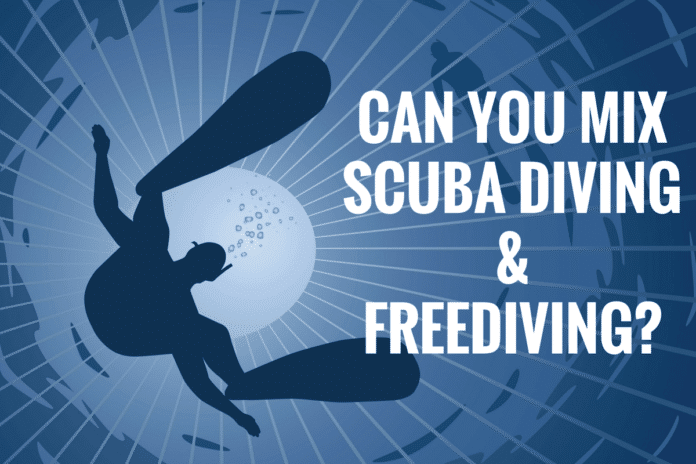There is an argument heard many times in Freediving and Scuba Diving circles… “do not mix Freediving and Scuba Diving – it is dangerous”. It is also a contentious one as there are a group of vocal divers who feel you should be able to do both.
We came across this back in August 2015 when we republished an old infographic from Freedive Ireland titled “The #1 reason why Scuba Divers shouldn’t Freedive”. The headline was attention grabbing which drew it’s own criticism but more interesting re-ignited an intense debate on our Facebook Page that we felt should be addressed in more depth.
We reached out to Dr Neal W Pollock from Divers Alert Network, probably one of the foremost experts in Freediving Medicine, and discussed this at length to try and understand the latest medical research and thinking.
[Editor Note: For the purposes of this article we will consider Scuba Diving as compressed gas diving to any depth and Freediving as any breath-hold activity to any depth that could also include Spearfishing]
Up till recently the main discussion in diving circles centers on an article published in a 2011 issue of Alert Diver “Could Breath-Hold Diving After Scuba Cause Decompression Sickness” where Dr Neal W Pollock and Dr Robert M Wong discuss the potential risks involved in combining Scuba Diving and Freediving which essentially says whilst there is a risk that risk is very small for most Freedivers.
In my recent discussion with Dr Pollock he says
“The state of data has not changed the reasonable recommendations over the past three years. I am actually hearing fewer hints of decompression-related issues with freedivers, hopefully as a result of increasing awareness.”
So the news is good that Freedivers are having less incidents of decompression-related issues however what does that mean in reality? Dr Pollock continues
“I would still recommend that divers try not to mix meaningful freediving and compressed gas diving on the same day”
“Meaningful” is the key word here as this is the crux of the argument a lot of divers who practice both Freediving and Scuba Diving bring up that they have never had an incident.
A few key statements came up during the discussion that should be drawn out here to try and understand what “meaningful” is:
- Shallow, relaxed freediving (above 15 m / 49 ft), before Scuba Diving probably has negligible consequence with a modest surface interval that allows the diver to start the compressed gas dive in a fully relaxed state. We do not have the data to confidently establish minimum surface intervals time, particularly since the interpretation of “relaxed” can vary widely. The rule of thumb for the minimum surface interval between shallow freedives would be the starting point – at least twice the breath-hold time of the last dive. Longer surface intervals would provide additional cushion.
- Even shallow, relaxed freediving (above 15 m / 49 ft), after Scuba Diving should be delayed if only for an abundance of caution. We see clear differences in patterns of intravascular bubble presence following compressed gas dives. Bubbles do not equal decompression sickness (DCS), but they are a measure of decompression stress. The absence of bubbles evident through repeat scanning is associated with an extremely low likelihood of DCS. Since most individuals do not know their propensity for bubbling (despite what their dive computers or the internet may tell them) – physical exercise, especially vigorous physical exercise, should be avoided after scuba diving. Relaxed post-dive snorkeling on the surface is fine, but the deeper and more physically engaging the freedive, the longer it should be delayed post-dive.
- More aggressive freediving (below 15m / 49ft) is best left for the next day. The potential negative outcome is simply not worth the risk.
So what would we recommend? Ultimately to be as safe as possible any Freediving activity should not be mixed with Scuba Diving on the same day – follow the same principle as “no fly” guidance (i.e. wait till you have off-gassed completely) on dive computers.
If you feel compelled to combine both kinds of diving on the same day (which we strongly recommend you shouldn’t) it should only be before Scuba Diving and at a depth shallower than 15m/49ft with long surface intervals.

